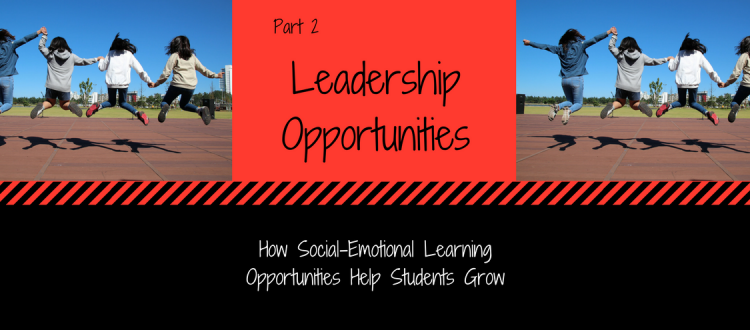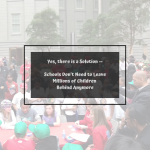Educating the Whole Child: How Social-Emotional Learning Opportunities Help Students Grow – Part 2 on Leadership Opportunities
Teaching is more than just a curriculum framework. It is about building relationships and the social and emotional skills of our students too. This is part two of a three part series about how social-emotional learning (SEL) opportunities help students grow, and specific ideas to help make that happen in your class.
Part 2: Providing Leadership Opportunities
One of my favorite activities every year was to have my fifth grade students apply for jobs in my room–the class meteorologist who updated the daily weather forecast, the geographer who provided a “fun fact of the week” during snack time, my technology experts, and even the DJ for our Friday afternoon dance parties. It was a job the student had for the entire year so it was a big deal. These jobs were more than my rotating weekly jobs such as the lunchroom helpers; they were jobs that sometimes required skill or a particular interest.
A Call for Help
To generate interest for my classroom jobs, I created a bulletin board listing all of the jobs and the qualities I was looking for in the candidate. My “Wanted” posters also asked  guiding questions to help students determine if the job was right for them. During class, I explained to them the importance of their contributions to the smooth operation of our classroom community. In addition, I provided some mini-lessons on why and how to write a good resume and how to prepare for a job interview. Everyone was required to apply for at least one job and everyone received at least one job.
guiding questions to help students determine if the job was right for them. During class, I explained to them the importance of their contributions to the smooth operation of our classroom community. In addition, I provided some mini-lessons on why and how to write a good resume and how to prepare for a job interview. Everyone was required to apply for at least one job and everyone received at least one job.
Resume Writing in Fifth Grade
Writing a resume was a good experience for my students. It allowed students to reflect on their accomplishments, behaviors, and qualities. It was a miniature “This is Your Life” reflection. I provided templates of two different resume styles but also allowed students to create their own. We talked about writing for a purpose and how that should look on a resume. I required references too. Yes, references! I wanted the students to have to ask an adult, someone OTHER than a family member, if they would be listed as a “character reference” for the job they were seeking in my class. Each year, I always contacted one of the references, which my students knew, so they understood how important asking their reference was to this process. Of course, I would always accept the reference of the previous year’s teacher or another school professional but students included names of after school teachers, coaches, their friends’ parents and more.
The Best Dressed Fifth Grader
The best part of the entire experience was the interview. I interviewed each student for about 3-5 minutes, starting and ending with a handshake, and asking them why they were the best candidate for the position to which they were applying. I was very serious about this process. Beforehand, I talked about the importance of using appropriate language, making eye contact, using a firm handshake, and how to prevent fidgeting. One year, a boy came to school wearing a coat and tie because he was being interviewed for his class job that day! Yes, he received his first choice of jobs.
While this sounds very complex, I finished this entire process within two to three weeks by capturing little snippets of time here and there to teach the mini-lessons and to hold my interviews. I embedded these activities within my Language Arts block since we were writing and practicing oral communication skills. The interviews served as a formative assessment for oral communication skills. They also allowed me to assess speech patterns for each student to determine if I should confer with our school’s Speech Language Pathologist.
During this entire process, my students provided great feedback and we had valuable discussions. Students reported back that they had conversations with their family members about their current or former job searches. Students also made valuable connections between behavior and consequences. Finally, students reflected on the entire experiences and shared their thoughts, with students nodding in agreement that they were most nervous during their interview. Providing students with this time to reflect on their work, activities, and interview process was so important for their social and emotional development.
Not every job was carried through with the utmost care but the leadership experience provided opportunities for all of my students to earn a job, make it their own, and see how their actions impacted our classroom culture.
Barb Bailey is the Director of Learning at LearningPlunge, Inc. She has a Master of Education degree and 15 years of teaching experience. Barb is committed to providing high quality educational resources for all children. Reach out to her at [email protected].
 Barb Bailey is the Director of Learning at LearningPlunge, Inc. She has a Master of Education degree and 15 years of teaching experience. Barb is committed to providing high quality educational resources for all children. Reach out to her at [email protected].
Barb Bailey is the Director of Learning at LearningPlunge, Inc. She has a Master of Education degree and 15 years of teaching experience. Barb is committed to providing high quality educational resources for all children. Reach out to her at [email protected].









